Text
Today is my very first event at university! I’m freaking out because I didn’t get my identification yet. But they probably aren’t even going to check who is who.
4 notes
·
View notes
Photo

Reading 'Think of a Numb3r' by John Verdon.
0 notes
Photo

Repeating kanji, readings and meanings. My notes today are so messy, but I'm extra proud of them 💓💓💓. It's just a tiny quiz for the recent kanji I've learned, but I did an awesome job!
2 notes
·
View notes
Text
Anime Vocab

Fairy Tail ~ Ep 19
魔法 - まほう 問題 - もんだい 時間 - じかん 永遠 - えいえん 戻る - もどる 成る - なる 調べる - しらべる 読む - よむ 解く - とく
1 note
·
View note
Photo



Starting a new book from one of my fav authors.
0 notes
Photo

Sorry I have been away. I got a bad cold and slept most of the day. Now I'm better and I have enough physical power to get out of bed. And the best part is that I don't have a headache any longer! 🎉 Who even likes being sick? Anyway, now I'm getting back on track starting with a goal. I want to be able to read this book (The Princess and the Pilot) by the end of 2018. I loved the film, so I'm looking forward to read this book. Any other light novels you peeps love and can recommend?
1 note
·
View note
Text
Got my official acceptance letter today!!! 🎉
I am now a university student by all means.
0 notes
Link
List of 188 Japanese particles with meaning / usage
は (wa)Indicantes the topic of a sentence
か (ka)At the end of a sentence indicating a question
が (ga)Indicates the subject of a sentence
に (ni)Indicates a location
の (no)Indicates possession
は (wa)Indicates a contrast between 2 items
に (ni)Indicates time or frequency
へ (e)Indicates direction
を (wo/o)Indicates the direct object of a verb
と (to)Used to connect and list up multiple items
や (ya)Used to connect and partially list up multiple items
など (nado)Used with や (ya) to partially list up multiple items
も (mo)means “too”, “either”, “also”
も (mo)both…and…, neither…nor…
に (ni)Indicates the indirect object of a verb
に (ni)Indicates the surface of a object where some action takes place
で (de)Indicates the location of an action
と (to)Together with
の (no)Indicates an apposition
から (kara)Indicates a starting point in time or place
より (yori)Indicates a starting point in time or place but more formal than kara (20)
まで (made)Indicates a limit on time, space or quantity
くらい (kurai)Indicates an approximate amount
ほど (hodo)Indicates an approximate amount
ばかり(bakari)Indicates an approximate amount
で (de)Indicates a means or material
か (ka)Indicates a choice or alternative
を (wo/o)Indicates a point of departure
を (wo/o)Indicates a route of a movement/motion
に (ni)Indicates a point of arrival
に (ni)Indicates an entering motion
に (ni)Used together with a verb to express a purpose
と (to)Used when quoting someone
と いう (to iu)Indicates the name of something
とか (toka)“something like”
で (de)Indicates a limit or scope
と (to)Indicates a comparison
より (yori)Indicates a comparison
より (yori)Indicates superlative
くらい (kurai)Indicates a comparison
ほど (hodo)Indicates a comparison in a negative sentence
か (ka)someone, something
も (mo)“nothing”, nobody”, nowhere” if used with an interrogative word
に (ni)Used with a verb to indicate a change or choice
をする (wo/o suru)Expresses an occupation or position
でも (demo)Indicates emphasis
でも (demo)Together with an interrogative word it means “anything”, “anyone”, any time”
で (de)Indicates a cause or a reason
から (kara)Indicates a source such as a giver, a cause or material
に (ni)Indicates a person who gives something or who provides a service
は (wa) + が (ga)Indicates the relation between an object / subjects and a verb or adjective
が (ga)Connects two sentences with the meaning “but…”
を (wo/o)Used with an verb expressing emotions, it indicates the cause of this emotion
で (de)Indicates a state / condition of something
で (de)Limits numbers
だけ (dake)Indicates a limit on things or amounts
だけ (dake)Indicates a limit on an action or state
で (de)Indicates the time of completion or expiration of something
でも (demo)Following a noun, means “or something like this”
も (mo)Emphasizes in a positive or negative way
でも (demo)Indicates two or more items as an example of a larger list
ばかり (bakari)Indicates that an item, state or action is a single one
ばかり (bakari)Indicates an action was just completed
ところ (tokoro)Indicates that an action takes place, just took place or is about to take place
が (ga)Indicates the subject of subordinate clause when it is different from the subject of the main clause
から (kara)conjunction meaning “after” or “since”
ながら (nagara)Indicates that an action is happening simultaneously
が (ga)Indicates the subject of a relative clause
の (no)Indicates the subject of a relative clause
から (kara)Used as a conjunction and indicates a cause or reason
ので (node)Indicates a strong reason
の (no)Indicates a modified pronoun
の (no)Used to nominalize verbs & sentences
なら (nara)Used as a conjunction and indicates a supposition or condition
なら (nara)Indicates a topics and is used as an alternative to wa (No.1)
と (to)Indicates a condition that results in an inevitable outcome
ば (ba)Used as a conjunction to express a probable results
ばいい (ba)“all you have to do…”
ば (ba)Used to enumerate two or more actions or states
たら (tara)Used as a conjunction, indicates a supposition or condition
たら (tara)Used as a conjunction to indicate that one action takes place before the action described in the main sentence
ところ (tokoro)Used as a conjunction to indicate a condition that brings about a discovery
ても (temo)a conjunction meaning “even if”
ても (temo)Used with a set of contrasting verbs and adjectives
ても (temo)Together with an interrogative word it means “no matter what/where/who”
ては (tewa)Indicates a condition which will bring a negative conclusion
のみ (nomi)Indicates a limit (similar to だけ dake)
まで (made)“even”, used to emphasize
さえ (sae)“even”, used to emphasize
さえ (sae)“if only” or “as long as”
のに (noni)“although”, “in spite of the fact that”
ながら (nagara)“although”, “though”, “but”
とか (toka)Indicates that a list of two ore more things or actions is not exhaustive
たり (tari)List of two or more actions in no particular sequence
たり (tari)Indicates actions or states that alternate
のに (noni)Indicates a purpose or function
のです (no desu)Asks for an explanation or reason
きり (kiri)Indicates a limit to an amount
きり (kiri)Indicates the last time a certain incident occured
とも (tomo)Used with numbers and counters to mean “both” or “all”
ながら (nagara)Used with numbers and counters to mean “both” or “all”
しか (shika)Used with a negative verb to indicate limits on conditions or quantities meaning “only”
しかない (shika nai)used with a verb meaning “to have no choice but to”
し (shi)Used as a conjunction, indicating two or more actions or states
し (shi)Used as a conjunction indicating a reason
とも (tomo)Indicates inclusion
に (ni)Indicates the one acting or the one acted upon
か (ka)Indicates uncertainty about something
か (ka)Indicates uncertainty about a state or reason
だの (dano) Indicates two or more items or actions of a longer list (similar to toka とか)
だの (dano)Indicates a pair of opposite actions or states
など (nado)“something to the effect”
やら (yara)Indicates two or more items of a longer list
やら (yara)Indicates uncertainty
ても (temo)Indicates an approximate limit with the meaning of “at the most”
とも (tomo)Indicates an approximate maximum or minimum
は (wa)Indicates that a number is the higher or lowest limit
と (to)Emphasizes a number in a negative sentence
など (nado)Indicates examples
くらい (kurai)Expresses an extent of an action or condition similar to ぐらい gurai
ほど (hodo)Indicates the extend of an action or condition
ほど (hodo)“the more… the more…”
だけ (dake)“as… as…”
だけ (dake)“the more… the more…”
と (to)“about to do something”, “trying to do something”
と (to)“even if…”, “whether… or not”
なり (nari)“either…”, “whether…or”
なり (nari)“anything”, “anyone”, “any time”
こそ (koso)Emphasizes the word preceding it
こそ (koso)Emphasizes a reason or a cause
ては (tewa)Expresses repetition of an action
に (ni)Joins two or more nouns to indicate a list of items
に (ni)Connects two or more items to indicate a matching or a contrast
にしては (ni shite wa)Indicates a generally agreed upon standard
にとって (ni totte)Indicates an effect or value of a person or thing
について (ni tsuite)“about”, “concerning” something or someone
とも…とも (tomo… tomo)“can’t say whether… or…”
が (ga)“even if”, “whether… or not”
は (wa)Emphasizes contrasting elements
として (toshite)Indicates status, capacity or function
として (toshite)Provides emphasis in a negative sentence
ばかりでなく(bakari de naku)“not only… but also”
だけ (dake) used to express “not only…but also”
のみ (nomi)used to express “not only…but also”
なり (nari)“as soon as”
146がはやいか (ga hayai ka)“as soon as”
やいなや (ya ina ya)“as soon as”
かないうちに (ka nai uchi ni)“no sooner had”, “hardly had”
ばかり (bakari)Indicates the only action left to do
ばかりに (bakari ni)Emphasizes a reason or cause
すら (sura)Emphasizes in the meaning of “even”
など (nado)Expresses a humble attitude towards an item
とも (tomo)“no matter what”, “even if”
ともあろうひと (tomo aroo hito)To express that someone did something not to be expected
どころか (dokoro ka)“far from”, “not to mention”
だけに (dake ni)Indicates a cause or reason
までもない (made mo nai)“there is no need to…”
ものの (mono no)“but” or “although”
ところで (tokoro de)“even if”
けれども (keredomo)Connects 2 sentences meaning “but” or “although”
けれども (keredomo)Indicates a preliminary remark
が (ga)Used to soften a statement or refusal
けれども (keredomo)Indicates a desire
ね (ne)At the end of a sentence to confirm a statement
ね (ne)At the end of a sentence to soften a request or suggestion
ね (ne)At the end of a sentence to indicate a reason or cause
ねえ (nee)At the end of a sentence to indicate emotion
よ (yo)At the end of a sentence to state a strong conviction
よ (yo)At the end of a sentence to articulate a request or suggestion
かしら (kashira)At the end of a sentence to express uncertainty, a request or a question and mainly used by women
かな (kana)At the end of a sentence to express uncertainty, a request or a question and mainly used by men
な (na)At the end of a sentence and used by men to confirm a statement
な (na)At the end of a sentence to express a prohibition, used by men
なあ (naa)At the end of a sentence to express emotion, used by men
なあ (naa)At the end of a sentence to express a desire
の (no)At the end of a sentence to express a question or soften a command, used by women
わ (wa)At the end of a sentence to soften a statement, used by women
さ (sa)At the end of a sentence to indicate slight emphasis, used by men
こと (koto)At the end of a sentence to indicate emotion, used by women
こと (koto)At the end of a sentence to express a suggestion or invitation, used by women
もの (mono)At the end of a sentence to express a reason or excuse
とも (tomo)At the end of a sentence to express an assertion
ものか (monoka)At the end of a sentence to express a negative determination, used by men
や (ya)At the end of a sentence to soften a statement, request or suggestion, used by men
たら (tara)At the end of a sentence to indicate a suggestion or proposal
やら (yara)At the end of a sentence to indicate a rhetorical question with a negative implication
ぜ (ze)At the end of a sentence to add for to sentence, used by men
ぞ (zo)At the end of a sentence to add force to a sentence or to express a question to oneself
8K notes
·
View notes
Text

What is the stress curve or scale? It is a tool to determine your stress levels and how you can identify them. Also what skills you can use to bring your stress level down until it doesn’t bother you any longer.
Identifying your stress levels > either use a scale of 10%~100% or as I do, just a numbering system from 1~10. You can identify general emotions within a certain range or write exact feelings that let you identify which number you’re on.
Example: 10: Don’t feel like doing anything, hard to focus, tired, everything is tiring me even more, sleepy, slow heartbeat (yes, also your body sensations can help you identify what you’re feeling), no sense of touch 5: melancholic thoughts, “something is missing”, very emotional and get angry at every little thing, tense muscles in arms and chest, hard to swallow. 1: neutral feeling, no positive feelings but no negative ones either
Identifying your stress tolerance > find out which stress level makes you especially vulnerable. Which level is ‘the level of no return’. Some people can clearly say “it is X (50%,60%,70% etc.)”. I found it very difficult personally because my stress tolerance is basically almost zero. So what I did was to identify vulnerabilities within the system.
Example: 1: when I’m at 1, I often end up thinking “why aren’t you ever happy even when everything is ok?”. This almost immediately causes my stress level to jump to two. 5: Melancholic thoughts open a door to negative feelings, self judgment and general absence of satisfaction. It jumps to 6 relatively easily. 10: For me, level 9 and 10 always interchange with one another and feed of each other, so it’s actually a good thing because it gives me the first push to be able to bring my stress levels back down.
Example for the simpler approach: 50%: This is the point at which it’s very hard to regulate my feelings and I easily end up at 100%. So I’m putting a warning here > need to use skills right away, otherwise it’s like a boulder.
Developing skills > When you know what you feel at every level and how you can identify it, you can begin to think of skills that can make you regulate your emotions. The crazy part is that even if you don’t realize you have emotions going on inside of you all the time, usually they are what overwhelms you. Skills need to be positive things you can do and usually, you would have to build several of them to form a “skill chain” to help you get out of an emotional roller-coaster.
Example:
5: Need to use skills that are active. If I remain passive in a melancholic period, I will find my stress levels go up very fast. At 6, for example, I begin feeling like I don’t want to do anything at all and being active makes me tired, so I already become active at 5 to avoid that. Being active can be working out, cleaning, doing errands and basically giving myself positive feedback fast. “You can do things”.
Remember, they must be positive to be skills. They need to be tailored for you. Even if something works for me, it doesn’t have to work for you - figure them out for yourself. Some examples of bad things that you shouldn’t do are binge eating, locking yourself in your room and not going out for long periods of time although you should, hurting yourself, closing up and not sharing anything that’s going on with you.
Example skills: feelings log, relaxation methods, yoga, needs log, being in the moment, accepting, setting goals, talking to people, drawing, creating music, cooking, cleaning, going out to enjoy nature, playing with ball, eating gum and so on. As you can see, skills can be anything if they’re helpful.
0 notes
Text
Japanese Phrases for Essays
初めに・はじめに to begin with; first of all まず first of all; to start with 最初に・さいしょに first 第一に・だいいちにfirst 劈頭第一・へきとうだいいち first and foremost 次に・つぎに next 更に furthermore そして and; thus その上に・そのうえに in addition; furthermore 他に・ほかに in addition; besides また also 並びに・ならびに both ~ and ~; ~ as well as ~ 及び・および and; as well as それだけでなく not only~ but also ~ のみならず besides; as well as しかも moreover; furthermore; nevertheless; and yet おそらく probably しかし however すでに already その結果・そのけっか as a result それにしては considering that それに対して・それにたいして contrary to this ため in order to; because of というのは the reason why is にしたがって following; in accordance with にとって for; concerning によって due to; because of 一方で・いっぽうで on the other hand 全く・まったく really; truly; entirely 全て・すべて overall; in general 多数の・たすうの countless; majority 必ず・かならず definitely 急速に・きゅうそくに rapidly increasing ますます increasingly; more and more; decreasingly (when declining); less and less 次第に・しだいに gradually; little by little 現在・げんざい nowadays 確かに・たしかに it is true that (but) 要すると・ようする in short 非常に・ extremely 要するに・ようするに in short 全く・またく absolutely 絶対・ぜったい absolutely 誠に・まことに absolutely 〜によると according to 〜によって due to 従って・したがって accordingly; therefore; consequently 事実上・じじつじょう actually; as a matter of fact; in reality だって also 結局・けっきょく after all おしまい in closing 終わりに・おわりに to finish; to end; to close やはり after all ようやく finally 加えて・くわえる in summary それに加え・それにくわえ to summarise 最後に・さいごに in conclusion
8K notes
·
View notes
Photo



Today’s study session went great. I know most everything passively from over 10 years of watching anime, but actually pulling it out into my active repository feels very rewarding. Writing is also crazy. I know it’s not Kanji yet even, but I’m glad that I get to practice hiragana while learning from Genki.
Today went over the particle は again and over questions. Additionally learned how numbers are read out loud. Basic, but fun.
3 notes
·
View notes
Photo


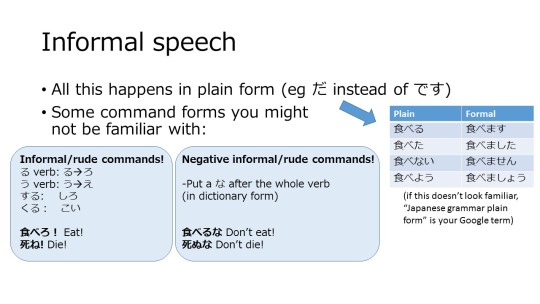
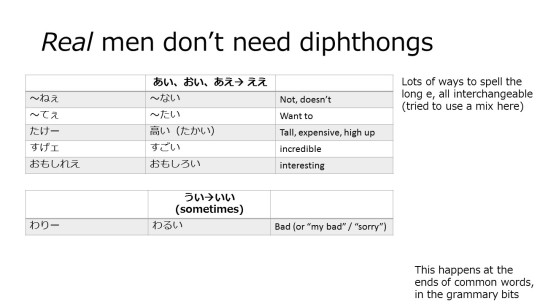
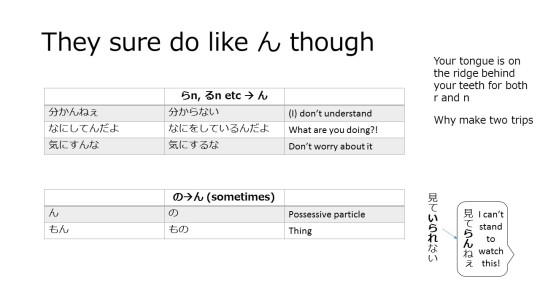

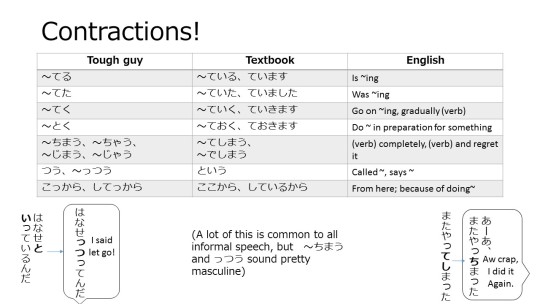
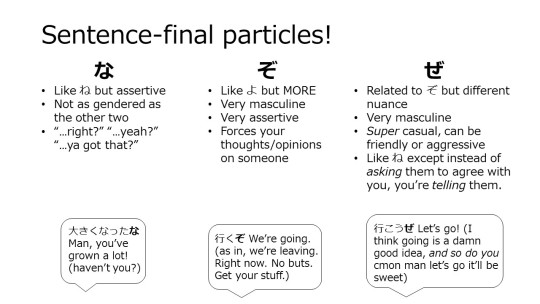
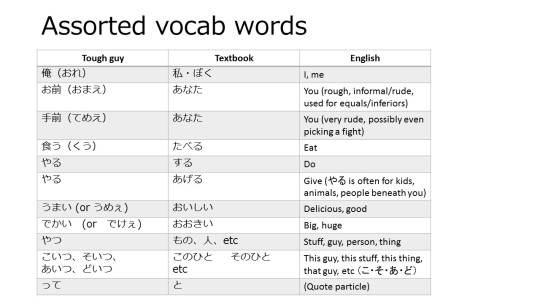

I figured I’d make a thing for anyone who needs to convert some anime tough guy talk into textbook Japanese real quick (click for big versions).
4K notes
·
View notes
Text
Finally done organising my tags page and removing older posts that aren’t relevant any longer. So as I already mentioned, I’m going to use this blog to accompany my Japanese studies (share resources, inspiration, generally track my studies and so on) and English literature studies. I will occasionally also write about mental health to keep track of how I feel and what I can do to better my well being.
So I’m going off to work out for now and afterwards I’ll go do an hour or two of Japanese. Today I’m going to university to hand out a few missing documents and next week, I’ll be an official uni student! It was always my dream :). So I feel pretty cool about myself atm.
1 note
·
View note
Photo

Refreshed Hiragana and Katakana and now off to the lands of what lies between the covers of the genki book. Sorry for the pic quality (it is super grainy for some reason). I played around with my phone yesterday and broke something 😅
8 notes
·
View notes
Photo


授業で使ってる本が届いた!今授業でやってるのは11課だから追い付かないとね^^;; The book we’re using in class arrived~ We’re on chapter 11 so I have a lot of catching up to do^^;;
58 notes
·
View notes
Text
Hey everyone! I've finished my last exam and now I've passed all of my finals :D!
I'm going to apply for Japanese and English Literature in university and decided to repurposed my blog to mostly focus on those. I'll go over all of my posts and probably clean up a lot.
I want it to be more functional and be a tool for me to study rather than procrastinate.
I will also write about mental health and how to deal with it while being a student.
0 notes
Photo

particles は + が // 19.07.17
2K notes
·
View notes